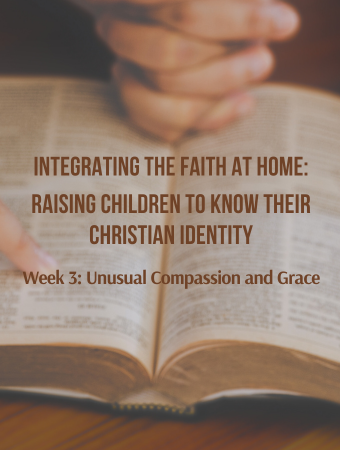
In this series, I’m focusing on practical ways for parents to ground their children in a God-given, Christian identity. At my house, we acknowledge our Christian identity by saying, “Because I’m a child of God, I am loved, chosen, forgiven, and redeemed.” We want this to inform all of our choices. We want it to influence the way we look at the world, and how we see ourselves in it. I believe this should be a Christian child’s first and most important identity, though “student,” “friend,” “sibling,” etc. may be other words to mark a child’s sense of being. In this article, I want to focus on compassion and grace in the home. We can maintain practical, innovative habits to direct attention toward our Christian identity, but if we’re not living with compassion and grace in our homes, our unplanned actions may overwhelm the intent of our carefully planned habits.
GRACE IN THE HOME
Ephesians 2:8-9 says: “For by grace you have been saved through faith. And this is not your own doing; it is the gift of God, not a result of works, so that no one may boast.”
God became sin on the cross. He became my sin and your sin so that we might become righteous. Grace is a gift. It is something we don’t deserve. We don’t earn it or work for it. Grace is given. But what does grace look like in the home? I think grace is giving patience when it’s not given to you. Grace is offering respect or understanding when it’s not shown to you. It’s a willingness to steady emotions, speak calmly, and appreciate one another, even when miscommunication or unintentional hurt seem to demand a more reactive response. Grace in the home is a focus on compassion, empathy, understanding, and care for another’s needs, even when we don’t feel that same concern for ourselves in the moment.
In practical application, grace is taking a moment to breathe before responding to a child who has unintentionally broken your glasses. It’s resisting the urge to meet a teen’s rising level of anger or frustration. Grace in the home is demonstrated by approaching a chaotic situation with peace and understanding. Grace does not humiliate or injure or accuse. It is a fresh start from a messy situation. It is calm in the storm. Grace is given when it is not deserved.
GRACE FOR YOU, THE PARENT
In order to cultivate an environment of grace, parents must first rest in grace for themselves. I think it is common for parents to feel like a failure. Maybe words were shouted. Judgements were swift or overly severe. Maybe a parent put their own needs above their child’s, or brought their own personal trauma to rest on the relationships they’re building in the home. Failure is like a heavy weight that compounds from one day to the next. But grace too, is compounding.



Grace in the home begins with you, the parent. When you know your God-given identity, you can rest in the grace that God has given to you. This is not just grace from the cross, but grace that is poured over you each and every day. You are called to parent the children in your home. God placed you over them as a leader, teacher, and guide. His grace is for you everyday. When you feel unworthy, incapable, or full of regret, God’s grace is yours. You are loved. You were chosen for this purpose. As a parent, you are forgiven. You are redeemed. Every day in every way.
GRACE WHEN YOU ARE NOT “ABLE”
I love what David Paul Tripp has to say about this in his book Parenting – 14 Gospel Principles that can Radically Change Your Family. He writes:
Like everything else God calls people to, God doesn’t call people to be parents because they are able. If you read your Bible carefully, you will understand that God doesn’t call able people to do important things. Abraham wasn’t able. Moses wasn’t able. Gideon wasn’t able. David wasn’t able. The disciples weren’t able, and the story goes on. The reason for this is that there are no able people out there. They just don’t exist. And they surely don’t exist as parents….God calls unable people to do important things because ultimately what he’s working on is not your immediate success, but that you would come to know him, to love him, to rest in his grace, and the live for his glory. God calls unable people to do important things so that he will get the glory and not them.
God’s grace rescues us (the parents) from our own failures. We are not able. We will never parent perfectly. But God’s grace is for us. His forgiveness is for us. In parenting, God provides the strength, wisdom, kindness, and joy that we need to flourish. He pours that over us so that we can extend the same grace to our children.

LAW AND GOSPEL
As Christian parents, it’s our job to raise children who know the law of the Lord. But knowing the law, and living by the law are two different things. Children are self-centered, demanding, and full of complaints. Like parents who are “unable,” children also fall short of perfection. We all fall short because of the sin that lives in us. Yes, our children need rules and curbs, and boundaries. They need guidance and consequences. But they also need grace. They will mess up and lash out. They will think of themselves before others. God’s law is there. Consequences are there. Grace needs to be there too.

We all fall short because of the sin that lives in us.
As parents, I believe that we should be open about our own shortcomings. We should be open about our sin. We need to let our children know that we see God’s grace poured over us each day. They need to know that it’s not just grace for us, but for them as well. There’s no better way to show the ripple of grace than to acknowledge forgiveness. We forgive ourselves and one another because God first forgave us. We can extend grace to ourselves and one another because it was first given to us. A pardon, fully undeserved for the fully unworthy.
COMPASSION BEYOND THE WALLS OF HOME
When we cultivate a place of grace, our children will naturally begin to extend that grace beyond the walls of home. This grace may overflow as compassion and empathy for others. When we see needs in the world, we can extend grace to others by donating our time or money. That grace is not earned but given because we care for others as God first cared for us.
We want grace to overflow in the friendships that our children experience. I can guarantee that your child will hear hurtful words. They will not be immune to conflict. Sin is messy, even in the lives of children. As parents, we should want our children to recognize the need for grace and be able to apply it as it’s modeled at home. The compassion and grace that we show in our homes will overflow through the words, thoughts, and deeds of our children. This is not by our hand, or our work, but by the grace of God.

OTHER POSTS IN THIS SERIES
Integrating the Faith at Home: Raising Children to Know Their Christian Identity
Second Week: Practical, Innovative Habits
Third Week: Unusual Compassion and Grace
Fourth Week: The Value of Christian Relationships
Fifth Week: Introducing Biblical Sexuality
Sixth Week : Faith-Filled Digital Citizens
Seventh Week: Managing God’s Wealth
Eighth Week: Professional and Personal Vocation
For another post that I’ve written on Christian Identity, see Christian Identity and Personal Wellness.






Leave a Reply
You must be logged in to post a comment.